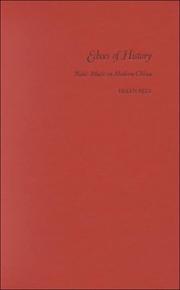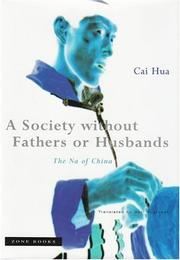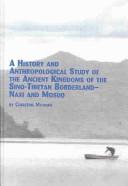| Listing 1 - 5 of 5 |
Sort by
|

ISBN: 0195129490 0195129504 9780195129496 9780195129502 1429401699 9781429401692 1280530529 9781280530524 9786610530526 6610530521 0198029632 9780198029632 0195351622 9780195351620 0197727840 Year: 2000 Publisher: New York Oxford University Press
Abstract | Keywords | Export | Availability | Bookmark
 Loading...
Loading...Choose an application
- Reference Manager
- EndNote
- RefWorks (Direct export to RefWorks)
This book is a chronicle of the musical history of Lijiang County in China's southern Yunnan Province. It focuses on the Dongjing music repertoire borrowed from China's Han ethnic majority by the Naxi inhabitants of Lijiang County
Naxi (Chinese people) --- China --- Music --- History and criticism --- Folk music --- Ethnomusicology --- 78.33.7 --- Moso (Chinese people) --- Moso (Tribe) --- Mosso (Chinese people) --- Na-hsi (Chinese people) --- Na-khi (Chinese people) --- Nahsi (Chinese people) --- Nakhi (Chinese people) --- Ethnology --- Tibeto-Burman peoples --- Yi (Chinese people) --- Ethnic music --- Traditional music --- Folklore --- History and criticism.
Book
ISBN: 0295804386 9780295804385 9780295992228 0295992220 9780295992235 0295992239 Year: 2012 Publisher: Seattle : University of Washington Press,
Abstract | Keywords | Export | Availability | Bookmark
 Loading...
Loading...Choose an application
- Reference Manager
- EndNote
- RefWorks (Direct export to RefWorks)
Lijiang, a once-sleepy market town in southwest China, has become a magnet for tourism since the mid-1990s. Drawing on stories about taxi drivers, reluctant brides, dogmeat, and shamanism, Emily Chao illustrates how biopolitics and the essentialization of difference shape the ways in which Naxi residents represent and interpret their social world.The vignettes presented here are lively examples of the cultural reverberations that have occurred throughout contemporary China in the wake of its emergence as a global giant. With particular attention to the politics of gender, ethnicity, and historical representation, Chao reveals how citizens strategically imagine, produce, and critique a new moral economy in which the market and neoliberal logic are preeminent.
Post-communism --- Naxi (Chinese people) --- Moso (Chinese people) --- Moso (Tribe) --- Mosso (Chinese people) --- Na-hsi (Chinese people) --- Na-khi (Chinese people) --- Nahsi (Chinese people) --- Nakhi (Chinese people) --- Ethnology --- Tibeto-Burman peoples --- Yi (Chinese people) --- Postcommunism --- World politics --- Communism --- Social life and customs. --- Economic conditions. --- Government relations. --- Lijiang Shi (China) --- Lijiang Diqu (China) --- Social conditions. --- Ethnic relations. --- Post-communisim --- S11/0497 --- S11/1223 --- Economic conditions --- Government relations --- Social life and customs --- China: Social sciences--Society since 1976 --- China: Social sciences--Noso, Naxi
Book
ISBN: 2130487394 9782130487395 Year: 2014 Publisher: Paris: PUF,
Abstract | Keywords | Export | Availability | Bookmark
 Loading...
Loading...Choose an application
- Reference Manager
- EndNote
- RefWorks (Direct export to RefWorks)
S11/1223 --- S11/1230 --- S11/0610 --- S11/0700 --- Naxi (Chinese people) --- Ethnology --- -Matriarchy --- -Gynaecocracy --- Gynarchy --- Gynecocracy --- Gynocracy --- Matriarchal families --- Women --- Families --- Matrilineal kinship --- Cultural anthropology --- Ethnography --- Races of man --- Social anthropology --- Anthropology --- Human beings --- Moso (Chinese people) --- Moso (Tribe) --- Mosso (Chinese people) --- Na-hsi (Chinese people) --- Na-khi (Chinese people) --- Nahsi (Chinese people) --- Nakhi (Chinese people) --- Tibeto-Burman peoples --- Yi (Chinese people) --- China: Social sciences--Noso, Naxi --- China: Social sciences--Others --- China: Social sciences--Marriage --- China: Social sciences--Clan and family: general and before 1949 (incl. names, clan rules) --- Matriarchy --- Gynaecocracy --- Naxi (Chinese people). --- Matriarchy - China - Yunnan Sheng --- Ethnology - China - Yunnan Sheng

ISBN: 1890951129 9781890951139 Year: 2001 Publisher: New York Zone books
Abstract | Keywords | Export | Availability | Bookmark
 Loading...
Loading...Choose an application
- Reference Manager
- EndNote
- RefWorks (Direct export to RefWorks)
Ethnology --- Matriarchy --- Naxi (Chinese people). --- Naxi (Chinese people) --- S11/0610 --- S11/0700 --- S11/1223 --- Moso (Chinese people) --- Moso (Tribe) --- Mosso (Chinese people) --- Na-hsi (Chinese people) --- Na-khi (Chinese people) --- Nahsi (Chinese people) --- Nakhi (Chinese people) --- Tibeto-Burman peoples --- Yi (Chinese people) --- Gynaecocracy --- Gynarchy --- Gynecocracy --- Gynocracy --- Matriarchal families --- Women --- Families --- Matrilineal kinship --- Cultural anthropology --- Ethnography --- Races of man --- Social anthropology --- Anthropology --- Human beings --- China: Social sciences--Marriage --- China: Social sciences--Clan and family: general and before 1949 (incl. names, clan rules) --- China: Social sciences--Noso, Naxi

ISBN: 0773466452 Year: 2003 Volume: 11 Publisher: Lewiston, N.Y. : Edwin Mellen Press,
Abstract | Keywords | Export | Availability | Bookmark
 Loading...
Loading...Choose an application
- Reference Manager
- EndNote
- RefWorks (Direct export to RefWorks)
Naxi (Chinese people) --- Matrilineal kinship --- Patrilineal kinship --- Moso (Peuple de Chine) --- Ethnic identity. --- Religion. --- Kinship. --- Identité ethnique --- Parenté --- Lijiang Zhuanqu (China) --- History. --- Social life and customs. --- S11/1223 --- -Naxi (Chinese people) --- -Matrilineal kinship --- -Patrilineal kinship --- -Agnatic descent --- Agnatic kinship --- Patrilineal descent --- Patriliny --- Unilineal descent (Kinship) --- Patriarchy --- Matrilineal descent --- Matriliny --- Matriarchy --- Moso (Chinese people) --- Moso (Tribe) --- Mosso (Chinese people) --- Na-hsi (Chinese people) --- Na-khi (Chinese people) --- Nahsi (Chinese people) --- Nakhi (Chinese people) --- Ethnology --- Tibeto-Burman peoples --- Yi (Chinese people) --- China: Social sciences--Noso, Naxi --- Ethic identity --- Religion --- Kinship --- Lijiang Diqu (China) --- -Lijiang Diqu (China) --- -History --- Social life and customs --- -China: Social sciences--Noso, Naxi --- Identité ethnique --- Parenté --- Agnatic descent --- Ethnic identity --- Li-chiang ti chʻü (China) --- Li-chiang ti chʻü, China --- Lijiang Shi (China)
| Listing 1 - 5 of 5 |
Sort by
|

 Search
Search Feedback
Feedback About UniCat
About UniCat  Help
Help News
News